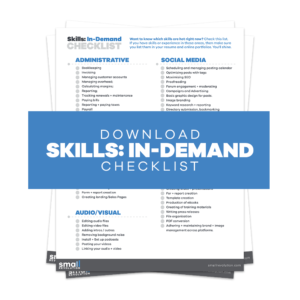Not hearing back from a recruiter after an interview is probably one of the most frustrating aspects of searching for an online job.
You’re careful to pick the roles that fit your skills and experience as exemplified by the number of interviews you have lined up.
And so you can’t help but feel excited about finally landing a remote position and enjoying all the benefits that come with it.
Unfortunately, the offers are not forthcoming.
If you’re lucky to get a response, the recruiter probably remarks that, while you were a strong candidate, they picked someone else who was a better fit for their needs.
If your job search efforts are stalling at the interview stage, take that as an indicator that your interviewing skills aren’t up to par.
Luckily, taking a fine-comb through your candidature can help you diagnose your shortcomings and fix them.
You’re A Skilled but Unremarkable Candidate
You’ve just come from an interview with your dream employer, and you have a good feeling about it.
You had a reasonable answer to every question and were careful not to make any significant mistakes.
You feel that you did a swell job, and you’re hopeful that the hiring manager will call you with a job offer.
Unfortunately, you may wait for that all-too-important call in vain.
That’s because recruiters don’t hire employees who make passing grades during the interview.
Instead, they’re looking for outstanding applicants who leave a lasting impression and wow them with their unbridled enthusiasm and skills.
You’ll hardly land the job if the hiring manager has to refer back to their notes to remember your name, even if you have strong qualifications.
You want to come off as a warm and competent – someone the recruiter can look forward to spending time with on the job.
If you’re personable but lack specific skills, the recruiter might consider hiring you on the condition that you make an effort to acquire those particular skills.
It’s not strange for managers to rethink their hiring criteria and prioritize personality and aptitude over experience if they feel you will make a good fit.
Having dealt with hundreds of employees in the course of their careers, human resource managers pick their battles carefully.
They understand that it’s easier to get a remote employee to build their skills than to get them to change their personality.
Some companies are happy to pick up the tab when you enroll for specialist courses that enhance your knowledge.
On the other hand, if you’re skilled, but struggle to connect with the interviewer, you can work on improving your interviewing skills.
You Have Poor Interviewing Skills
Despite being skilled and qualified, most people are doused with a healthy dose of interview anxiety, and that can lead to a dismal performance.
Sweaty palms, shortness of breath, tunnel vision, and a racing pulse are some of the most obvious signs of interview anxiety.
With so much riding on the outcome of the interview, it is only natural to experience some form of anxiety.
You can stress over what to wear, how to answer each question correctly, or how to prove that you’d be a valuable addition to the company.
Unfortunately, giving in to this anxiety lets you come-off as a nervous wreck and crushes any hopes of getting shortlisted.
You could ask an embarrassing question that reveals your lack of research or fail to ask any question at all, which further exposes your lack of preparation.
Luckily, you can overcome any crippling interview anxiety with adequate preparation.
You need to double down when researching the organization, rehearse interview questions, and practice turning your skills and expertise into powerful, compelling stories to ace an interview.
Remember, you can’t pick the interview questions, but you’ll certainly perform better if you’re highly knowledgeable about the potential employer and their needs.
If you have thorough knowledge about the company and have worked on your storytelling skills, you can compellingly tackle any question thrown your way.
You also need to hone your interview skills if you’re to leave a lasting impression on the recruiting officer.
Mock interviews are an incredible way to get over interview anxiety, polish your delivery, and overcome any shortcomings.
You can have one or more friends form an interviewing panel and work on your delivery and presentation until you have it down to an art form.
Note any shortcomings that bubble to the surface during the mock interview and work on them as well.
There are numerous guides on the internet, some written by seasoned human resource experts, to help you with this issue.
Alternatively, you could hire a professional mock interviewer and harness the benefits that come with working with an expert.
You’re Desperate and It Shows
Honesty might seem like the best policy when your dream job is within reach.
Surprisingly, gushing over how delighted you are for a chance to work for your dream company might ruin your chances of getting hired.
At this point, you become so focused on your needs that the company comes a distant second.
That might cause the hiring manager to pass you over for someone who doubles down on what they can offer the company.
Rather than gush about your dreams of joining the company, focus on demonstrating your value and suitability for the role.
Give thoughtful answers as to why you are applying for the role and what value you bring to the company.
Focus most of your effort on how you’d benefit the company instead of laying all emphasis on why you need the job.
Start by explaining what drew you to apply for the role and highlight some of the projects or products that you love and would like to work on.
Demonstrate how you’d approach some potential projects for the company while keeping in mind their work culture.
For instance, don’t say you’re amenable to working an 80-hour week at a company whose culture and values center around maintaining work-life balance.
That only serves to expose you as a job applicant who couldn’t be bothered to research and understand the values of the company you wish to join.
Instead of acting like an enamored fan meeting their celebrity idols, communicate your motivation to join the company and how you intend to be a valuable asset to it.
Focusing too much on why you need the job means that you’re not spending enough time on how the company will benefit by bringing you on-board.
The real motivation behind any hiring process is to onboard an employee who will add value to the company, and that’s what you need to demonstrate.
Instead of empty rhetoric about why you love the company, make a list of what you love about the company.
Every time you mention an item on the list, explain how you can support, improve, or expand it if brought on board.
The odds are that the suggestions may not work for the company, but that affords you a chance to demonstrate your creativity, thought process, and the ability to think on your feet.
Don’t squander any chance to demonstrate that you can be a valuable addition to the company.
Tower Over Other Job Seekers
Recruiters often have more than one candidate lined up when looking to fill a position.
That means you’re up against an army of motivated job seekers determined to get hired.
Rather than go through the motions, make an effort to package yourself as an exciting candidate who’ll make a valuable addition to the company.
If you’re personable, have the requisite skills, and display considerable aptitude, you’ll undoubtedly make a positive impression on the recruiter.
Picking an additional skill set in addition to your primary area of specialization can let you tower over other applicants.
For instance, if you’re an engineer who’s familiar with copywriting, you can be instrumental in making an engineering firm’s communication materials more consumer-centric.
You can ensure the brochures, posters, and newsletters are not riddled with technical jargon and ensure they focus on solving a pressing problem for the buyer.
Raising such an issue during an interview lets the recruiters sit up and take notice, earning you a top spot on the shortlist.
You can hone and polish your SEO and eCommerce copywriting skills and more by enrolling at Small Revolution.
Small Revolution brings you world-class training courses led by thought leaders in the sector while affording you the privilege to learn at your most comfortable pace.


